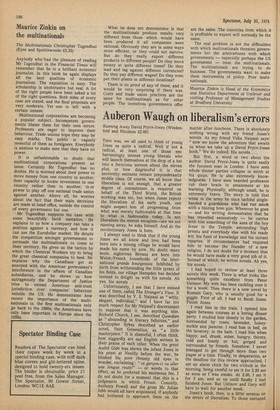Maurice Zinkin on the multinationals
The Multinationals Christopher Tugendhat (Eyre and Spottiswoode £3.25) Any body who had the pleasure of reading Mr Tugendhat in the Financial Times will remember that he is a brilliant economic journalist. In this book he again displays all the best qualities of economic journalism. The exposition is easy. The scholarship is unobtrusive but real. A lot of the right people have been asked a lot of the right questions. Both sides of every case are stated, and the final proposals are very moderate. Yet one is left with a certain unease.
Multinational corporations are becoming a popular subject. Incompetent governments blame them for their own errors. Professors are eager to improve their behaviour. Trade unions hope they may be easy marks. The public is vaguely resentful of them as foreigners. Everybody is anxious to make sure that they have no power.
It is unfashionable to doubt that multinational corporations present an issue. Certainly Mr Tugendhat has no doubts. He is worried about their power to move money from one country to another, their capacity to locate investment in one country rather than in another, their power to play off one national trade union against another. Above all, he worries about the fact that their main decisions are made at head office, outside the control of every government but one.
Mr Tugendhat supports his case with some beautifully lucid narrative. He explains to us how a company can take a position against a currency, and how it can use the Eurodollar market. He details the competition amongst governments to persuade the multinationals to come to their territory. He gives us the tactics by which the Chemical Workers try to bring the great chemical companies to heel. He explains why the Canadians get so annoyed with the American government's interference in the affairs of Canadian subsidiaries, and he shows us how outrageously the Department of Justice tries to extend American anti-trust jurisdiction over companies' behaviour outside the US. He demonstrates how recent the importance of the multinationals is; the first multinationals only go back to the 1860s, the Americans have only been important in Europe since the 1950s.
What he does not demonstrate is that the multinationals produce results very different from those which would have been produced if all companies were national. Obviously they are in some ways more efficient, or they could not survive. But do they really export different products to different people? Do they move money at quite different times? Do they lead and lag against different currencies? Do they pay different wages? Do they even put their plants in different locations?
There is no proof of any of these, and it would be very surprising if there was. Costs and trade union practices are the same for multinationals as for other people. The incentives governments offer
are the same. The countries from which it is profitable to export will normally be the same.
The real problem is not the difficulties with which multinationals threaten governments but the arbitrariness with which governments — especially perhaps the US government — treat the multinationals. The multinationals are trying to do business. The governments want to make them instruments of policy. Poor multinationals.
Maurice Zinkin is Head of the Economics and Statistics Department at Unilever and visiting Professor of Management Studies at Bradford University










































 Previous page
Previous page